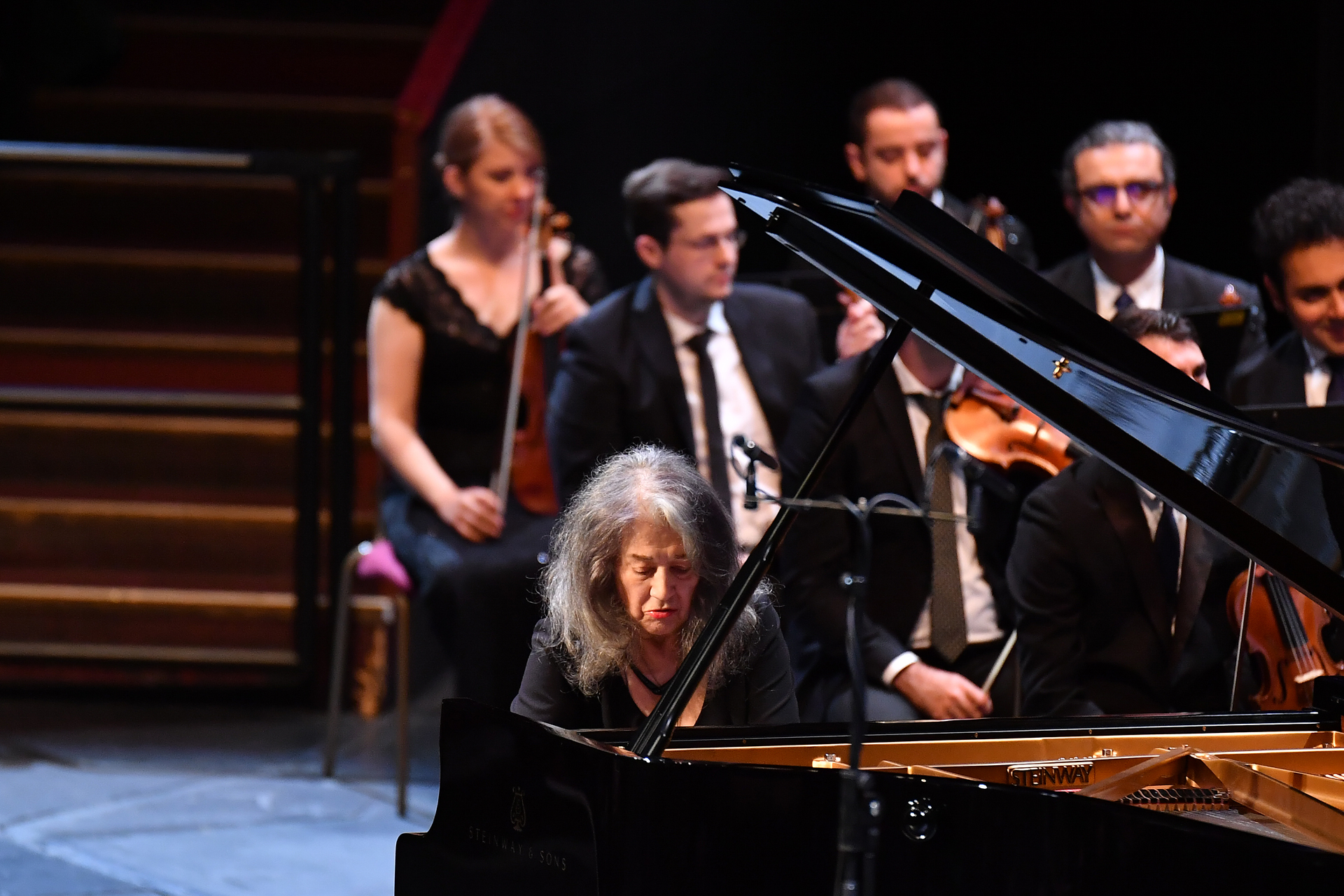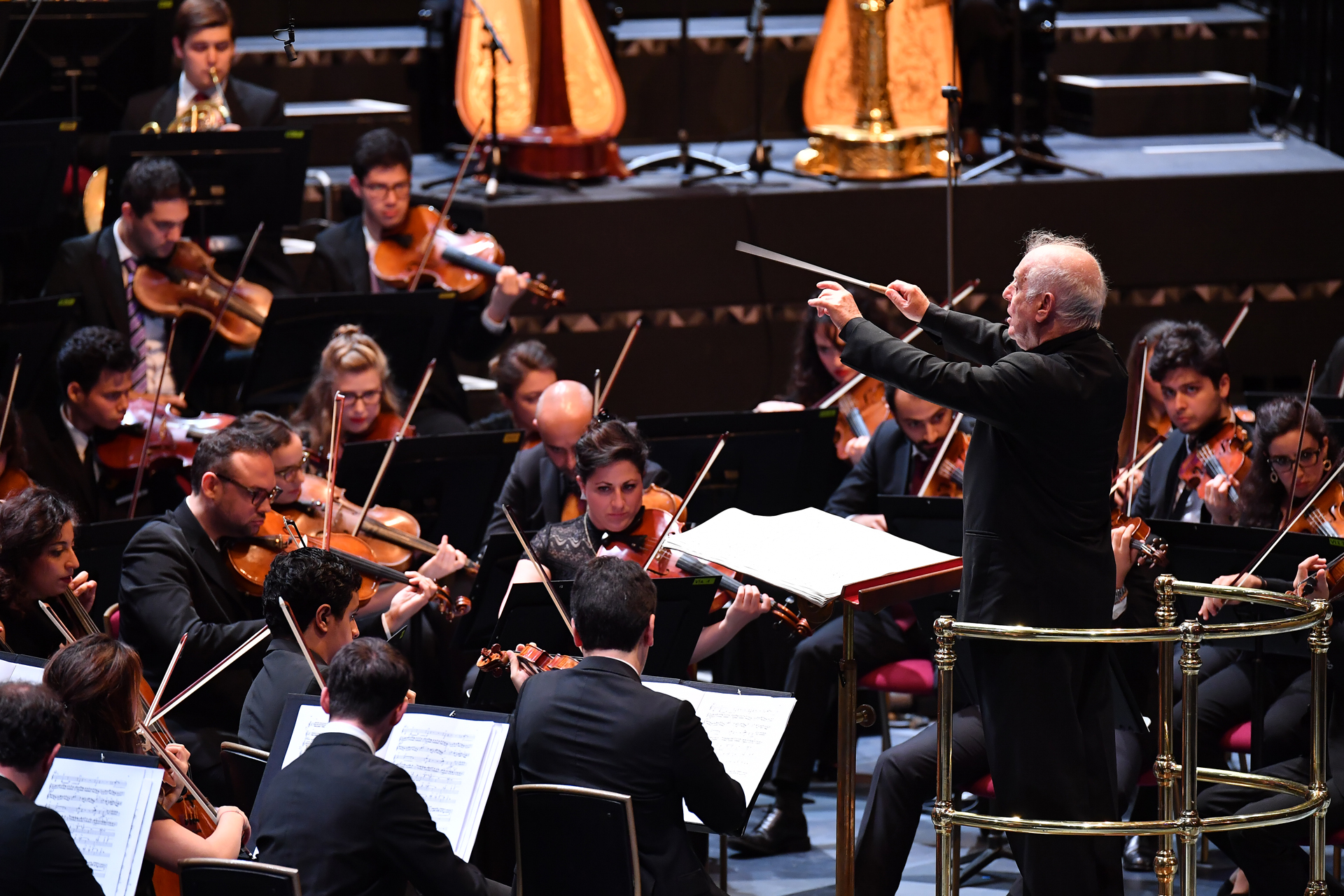Prom 34: Argerich, West-Eastern Divan Orchestra, Barenboim review - erratic star, sleek ensemble | reviews, news & interviews
Prom 34: Argerich, West-Eastern Divan Orchestra, Barenboim review - erratic star, sleek ensemble
Prom 34: Argerich, West-Eastern Divan Orchestra, Barenboim review - erratic star, sleek ensemble
Uncollegial virtuosity in Tchaikovsky, sophistication in Schubert and Lutosławski
Perhaps those who came for the Argerich touch and left at the interval of this instant-sellout Prom were satisfied. After all, the legendary Argentinian pianist gave us some vintage minutes of her silk-spinning mercurialism.
Kudos, as always, to the ongoing WEDO project of Barenboim and the late Edward Said as it brings together Jewish, Muslim and Arab Christian musicians from the Middle East and Spain in its four-year degree programme (the latest group enrolled in 2015). It's always a shame that for security reasons the players can't be named so that one can't give due credit, for instance, to the powerful first oboist. The strings' hallmark fervour duly flamed at the heart of the two movements in Schubert's "Unfinished" Eighth Symphony. They were earthed by Barenboim's care over phrasing and encased with pianissimos encouraged by a master who has always stated that in the Albert Hall, you draw the listener in rather than force the sound out. For a conductor who often tends to the grandiose, Schubert's Andante con moto lilted at a fair speed, though it was a mistake, given this tenderness, to ignore the Allegro moderato's exposition repeat (according to Elisabeth Leonskaja, when any student omitted repeats in the sonatas, Sviatoslav Richter would ask "what? You don't love Schubert's music?") 
Vintage Argerich were the moments of flyaway fantasy here and at the scherzoid heart of the Andantino semplice, the clear articulation of the finale's dance theme; but the ferocious double octaves would test the strength of any 78-year-old, robust though Argerich undoubtedly is; I have no problem with the occasional wrong note, but did she have to charge at them with so much sustaining pedal to cover up? And could she not have been more generous to her orchestra? I thought she was about to do so in her last bow, but the gesture to the leader was only to make sure they followed her off, preventing the audience from further demanding an encore.
Lutosławski's Concerto for Orchestra brought teamwork back to the spotlight - a far-back one, incidentally, as Barenboim had clearly learned from the venue to make sure his strings were closer to the brass and wind on the steps behind, leaving a space on the platform in front of them as if for a rerun of the physical drama of his Proms Ring. Evenness in the Intrada met with the eastern European snap of the bracing first theme; the Mendelssohn-in-the-20th-century fairy world of the central night caprice was duly scintillating. 
Only in the later stages of the final fresco did playing flag a bit; to sustain its grandeur, the third movement ultimately needs extrovert daring. It wilted, too, in the NYO's Proms performance five years ago under Edward Gardner; the tautest, most rigorous hold is needed here. Yet the players certainly got the full measure of the magic which permeates the score, as it does Bartók's Concerto for Orchestra; neither work is just a showcase. We had more firepower in the encore, Beethoven's Egmont Overture, better in grim determination than in the final victory tour, which just missed true exhilaration by a hair's breadth.
rating
Share this article
Add comment
The future of Arts Journalism
You can stop theartsdesk.com closing!
We urgently need financing to survive. Our fundraising drive has thus far raised £49,000 but we need to reach £100,000 or we will be forced to close. Please contribute here: https://gofund.me/c3f6033d
And if you can forward this information to anyone who might assist, we’d be grateful.

Subscribe to theartsdesk.com
Thank you for continuing to read our work on theartsdesk.com. For unlimited access to every article in its entirety, including our archive of more than 15,000 pieces, we're asking for £5 per month or £40 per year. We feel it's a very good deal, and hope you do too.
To take a subscription now simply click here.
And if you're looking for that extra gift for a friend or family member, why not treat them to a theartsdesk.com gift subscription?
more Classical music
 Kempf, Brno Philharmonic, Davies, Bridgewater Hall, Manchester review - European tradition meets American jazz
Bouncing Czechs enjoy their Gershwin and Brubeck alongside Janáček and Dvořák
Kempf, Brno Philharmonic, Davies, Bridgewater Hall, Manchester review - European tradition meets American jazz
Bouncing Czechs enjoy their Gershwin and Brubeck alongside Janáček and Dvořák
 Solomon, OAE, Butt, QEH review - daft Biblical whitewashing with great choruses
Even a top soprano and mezzo can’t make this Handel paean wholly convincing
Solomon, OAE, Butt, QEH review - daft Biblical whitewashing with great choruses
Even a top soprano and mezzo can’t make this Handel paean wholly convincing
 Two-Piano Gala, Kings Place review - shining constellations
London Piano Festival curators and illustrious friends entertain and enlighten
Two-Piano Gala, Kings Place review - shining constellations
London Piano Festival curators and illustrious friends entertain and enlighten
 Echo Vocal Ensemble, Latto, Union Chapel review - eclectic choral programme garlanded with dance
Beautiful singing at the heart of an imaginative and stylistically varied concert
Echo Vocal Ensemble, Latto, Union Chapel review - eclectic choral programme garlanded with dance
Beautiful singing at the heart of an imaginative and stylistically varied concert
 Scott, Irish Baroque Orchestra, Whelan, RIAM, Dublin review - towards a Mozart masterpiece
Characteristic joy and enlightenment from this team, but a valveless horn brings problems
Scott, Irish Baroque Orchestra, Whelan, RIAM, Dublin review - towards a Mozart masterpiece
Characteristic joy and enlightenment from this team, but a valveless horn brings problems
 Classical CDs: Voice flutes, flugelhorns and froth
Baroque sonatas, English orchestral music and an emotionally-charged vocal recital
Classical CDs: Voice flutes, flugelhorns and froth
Baroque sonatas, English orchestral music and an emotionally-charged vocal recital
 Kanneh-Mason, Britten Sinfonia, Shave, Milton Court - a grin and a big beaming smile
A pair of striking contemporary pieces alongside two old favourites
Kanneh-Mason, Britten Sinfonia, Shave, Milton Court - a grin and a big beaming smile
A pair of striking contemporary pieces alongside two old favourites
 theartsdesk at the New Ross Piano Festival - Finghin Collins’ musical rainbow
From revelatory Bach played with astounding maturity by a 22 year old to four-hand jazz
theartsdesk at the New Ross Piano Festival - Finghin Collins’ musical rainbow
From revelatory Bach played with astounding maturity by a 22 year old to four-hand jazz
 First Person: Manchester Camerata's Head of Artistic Planning Clara Marshall Cawley on questioning the status quo
Five days of free events with all sorts of audiences around Manchester starts tomorrow
First Person: Manchester Camerata's Head of Artistic Planning Clara Marshall Cawley on questioning the status quo
Five days of free events with all sorts of audiences around Manchester starts tomorrow
 Goldscheider, Brother Tree Sound, Kings Place review - music of hope from a young composer
Unusual combination of horn, strings and electronics makes for some intriguing listening
Goldscheider, Brother Tree Sound, Kings Place review - music of hope from a young composer
Unusual combination of horn, strings and electronics makes for some intriguing listening

Comments
The performance was one of
Yours is a very fair and
There were moments of
I don't think we disagree,
I don't think we disagree, then. Argerich and Abbado were always the dream duo in concertos. It's just that when you've encountered the ideal in terms of live concerto work - as I have, on several occasions in the last month (I'd argue that Shaham and Nézet-Séguin in the recent Prom Prokofiev Second Violin Concerto achieved it as well as Benedetti with NYO/WIgglesworth and Martin James Bartlett in Bach with Southrepps Strings/Parry) anything less seems to rob the music of something. Even though there are still passages Argerich can play like no-one else.
Indeed - Argerich and Abbado
I'm sure you're right about
I'm sure you're right about how she felt - we shouldn't second-guess, but the leading off of the players was a clear indication, I think, since I can't remember a time when she hasn't given an encore, whether with Barenboim at the keyboard or by herself (that unforgettable Scarlatti after the Prom Prokofiev Third Concerto - one of the most flawless slices of style I've ever heard). I like to think one usually senses discomfort in an artist when there's undue pressing forward, though she has never been one to linger. Anyway, thank you for so eloquently expounding. Clearly we both love and respect La Argerich, and wish her nothing but well (I half expected someone to say, 'how dare you attack a 78-year-old woman in that way?')
I also wondered why the WEDO
He was also there during the
He was also there during the Schubert but maybe he wanted to hear that too. Odd that I didn't think of your reason. Plausible, but unique in my experience. Certain soloists like Alban Gerhardt often like to join the orchestra in the second half of the concert, but that's different.